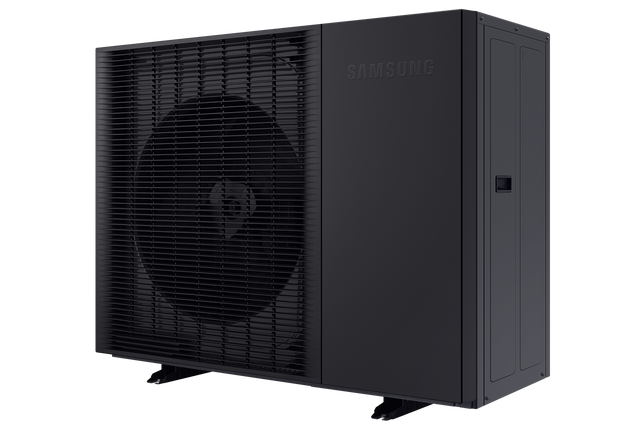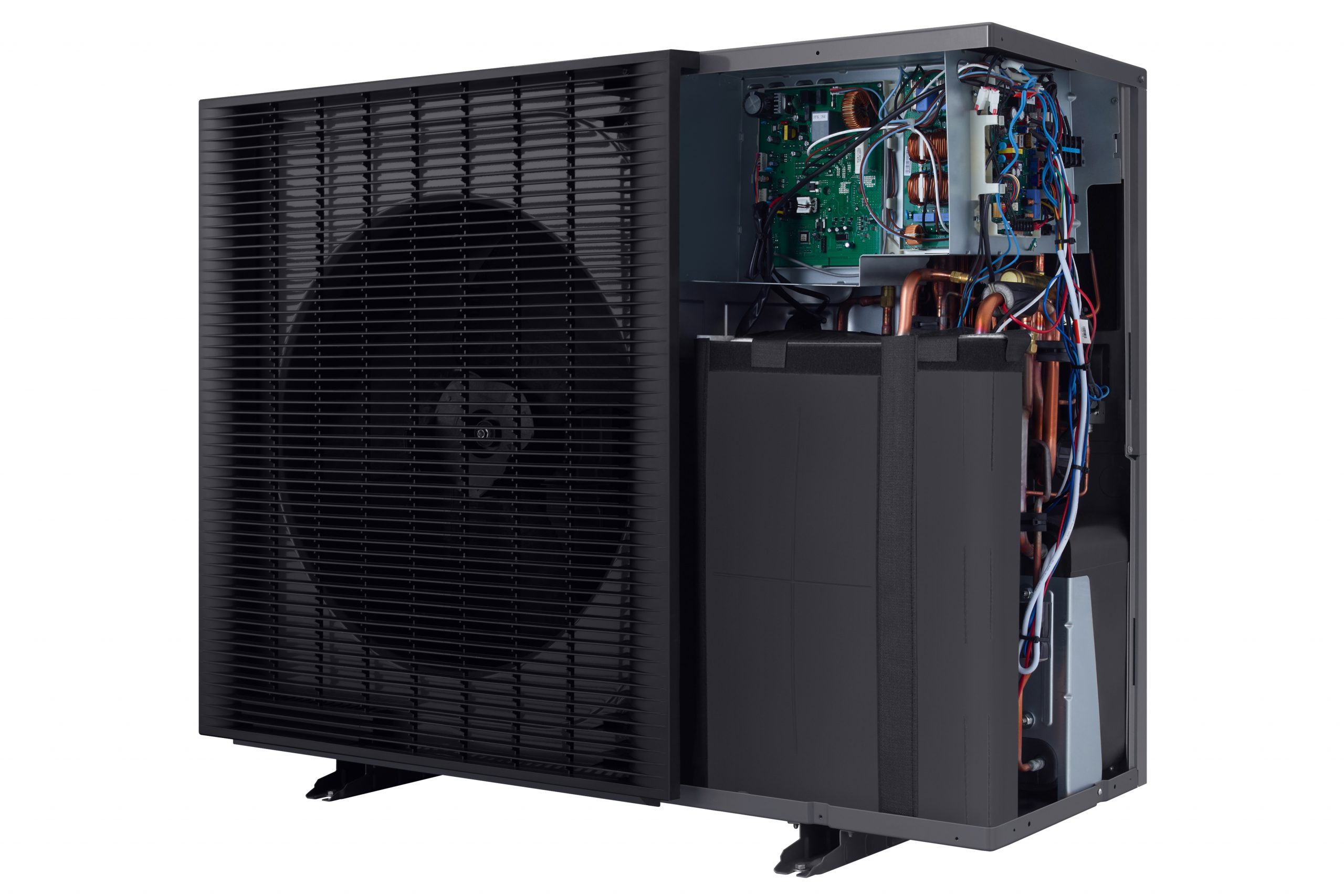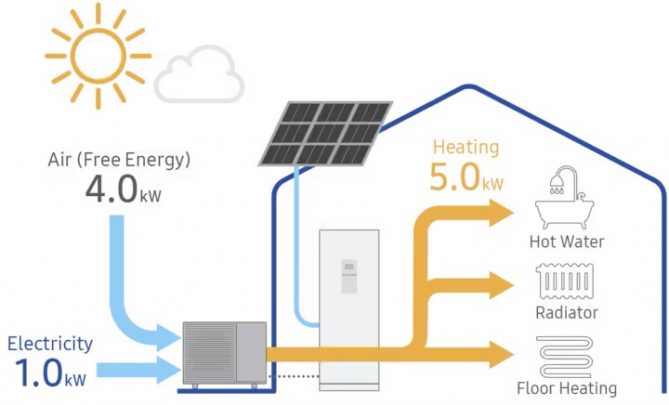Heat Pumps
Heat pumps offer a highly effective and energy-efficient way to heat your home. They work by taking the heat from the outdoors and transferring it to water. That hot air can then be used in underfloor heating or radiators, for example. It’s all about moving heat from one place – the outdoors – to another.
Heat pumps are capable of getting a 300%-400% efficiency rating, which is astounding. The fact is that the heat energy a heat pump produces far exceeds the amount of energy the actual unit is using.


Other benefits of installing a heat pump can include better safety ratings, they can require less maintenance, they have a long life span and are good for those eligible for the boiler upgrade scheme. We are happy to discuss all of these benefits and more, as well as discuss how the heat pump works, what’s involved in the installation and typical costs.
How Heat Pumps Work
A heat pump consists of a compressor and a circulating structure with a gas refrigerant or liquid in it. The heat pump itself uses very little electricity, especially when you compare it to a traditional electric boiler.
As the pump absorbs outside heat, it compresses and transfers it to your home. This is done via a heat exchanger. You can now use this heat to power your underfloor heating system, hot water cylinder, or radiator.

Why Choose an Air Source Heat Pump?
- Efficiency. When compared to traditional electric boilers, air source heat pumps are far more efficient, achieving an average efficiency rating of between 300% and 400%. This means it is capable of producing three to four units of electricity for every unit of energy it absorbs.
- Environmentally Friendly. Thanks to lower carbon emissions, installing a heat pump can help you reduce your carbon footprint and do your part for the environment and a greener future.
- Life Span. Another reason why heat pumps have become a popular choice for both residential and commercial properties is because they’re durable. Most air source heat pumps will last 20 – 25 years if maintained correctly.
- Low Maintenance. Heat pumps are one of the most stress-free ways to heat and power your home because they require minimal maintenance.
Is a Heat Pump Right for Your Property?
At Eco Home Group, we can help you determine whether an air source heat pump is right for your home based on its size, insulation and your existing heating system.
Heat pumps are a better choice for well-insulated homes, but larger properties, including commercial spaces, can benefit too. However, more than one heat pump may be required in a larger building. The same would apply if you have higher heat demands.
Another area where insulation becomes important is heat pump efficiency. Air source heat pumps work more efficiently in homes that are well-insulated.
Lastly, homes that rely on radiators for heat may need to consider whether a larger unit or even underfloor heating is required to ensure a heat pump can supply enough heat to the home.
Heat Pump Installation and Running Costs
There is no set cost for running an air source heat pump. The size of your home, heat pump, and your existing heating system, will all play a role in the overall cost. However, here are some average costs that you can work from as you plan your next steps.
Installation Costs
Heat pump costs range from £7,000 to £15,000. The complexity of the installation, the provider you choose, and the size of the system will dictate the final cost.
Should you need to replace your radiator or install an underfloor heating system to boost heating efficiency, this will naturally increase the overall cost.
You can look into the government’s Boiler Upgrade Scheme (BUS) to mitigate some of the
costs.
Operational Costs
Your heat pump operating costs will also depend on factors such as the size of your system, energy usage, electricity tariffs and your home’s insulation. The better insulated your home is, the more efficient your energy system will be.
Combining your heat pump with additional energy-saving tactics, such as draft-proofing and smart heating, can further reduce operational costs. These work by reducing the amount of heat your home needs, which means your pump doesn’t need to work as hard.
Even though the cost of installing and running an air source heat pump can vary, they’re still one of the most cost-effective ways to heat your home.
Reducing Heat Pump Costs Through the BUS
The Boiler Upgrade Scheme (BUS) is a government initiative that offers financial support to homes and businesses that choose to install low-carbon heating solutions. Reaching net zero emissions by 2050 is the goal behind the BUS.
Grants of up to £7,500 are available for heat pump installations, provided:
- You reside or own a property in England or Wales.
- An Energy Performance Certificate can be produced with no outstanding recommendations.
- The installation will replace any existing fossil fuel systems, including oil and gas.
- The system meets the full heating and hot water demands of the property.
Turn to Eco Home Group for Guidance on Heat Pump Installations
If you believe your home or commercial space could benefit from a heat pump installation, we can help get you started. We’re happy to talk you through all the benefits and the next steps to take to save on energy costs and do your part to reach a net zero target by 2050.
Our team has years of experience with energy-efficient systems for residential and commercial spaces. Along with guiding you on what’s best for your home or business, we can recommend the best products and installers to get the job done.
Eco Home Group recommendations are always customised and based on your unique needs.
There’s no reason to wait any longer to experience the benefits of a heat pump. Contact us to schedule a consultation.
Heat Pump FAQs
Heat pumps are 2-4x more efficient than a traditional boiler, but the amount of money you can save after installation will depend on several factors, namely the type, size and efficiency of the pump. Some UK customers have reported average savings of up to £200 over a 6-month period.
Yes, heat pumps can be used to heat a home via a radiator or even an underfloor heating system. Radiators are usually the preferred option for heating the upper levels of a home.
While we don’t deal with any installations ourselves, we can advise you on the best types of heat pumps to purchase for your home or commercial space, where to install them, and what products you can pair them with for maximum energy efficiency.
The UK is currently working on reaching a net zero target by 2050, which is why the government has launched the boiler upgrade scheme. Heat pumps are fast becoming the preferred option for heating homes and commercial spaces because they’re more efficient, the cost of gas is rising and grants are available too. There has never been a better time to meet with Eco Group Home to discuss your heat pump options.
Commercial heat pumps are readily available throughout the UK and are an energy-efficient way to heat your commercial space, while saving money and reducing your carbon footprint at the same time. The average commercial heat pump will only need to be replaced every 15+ years.